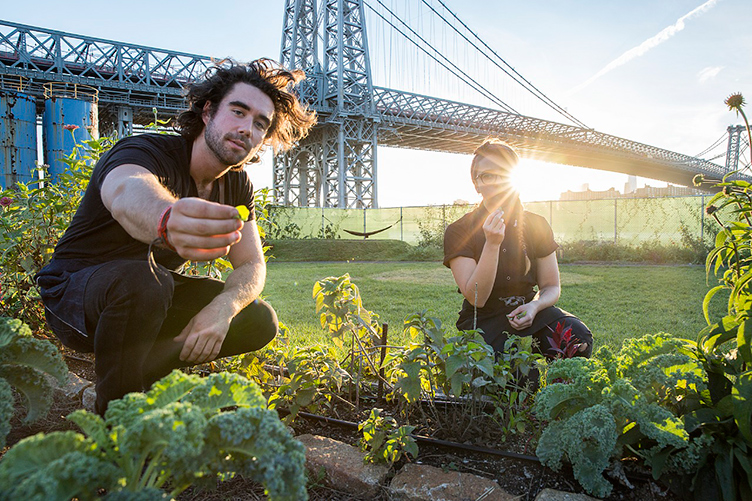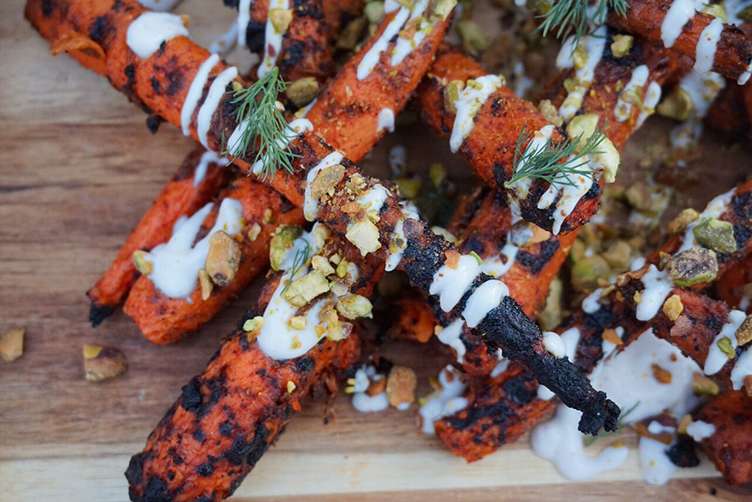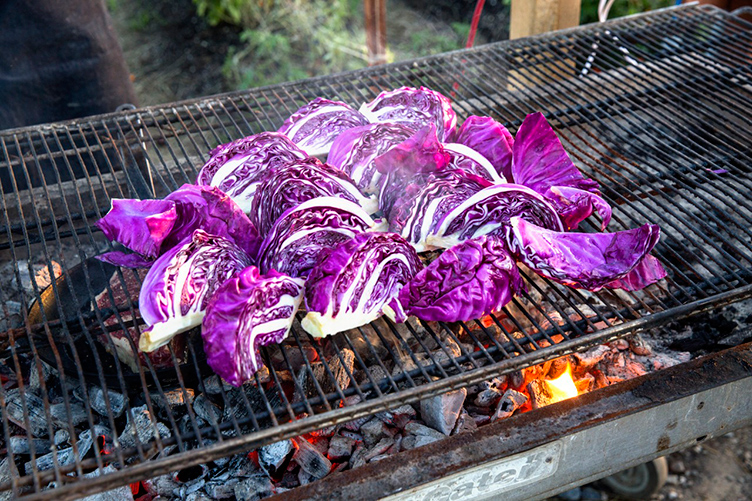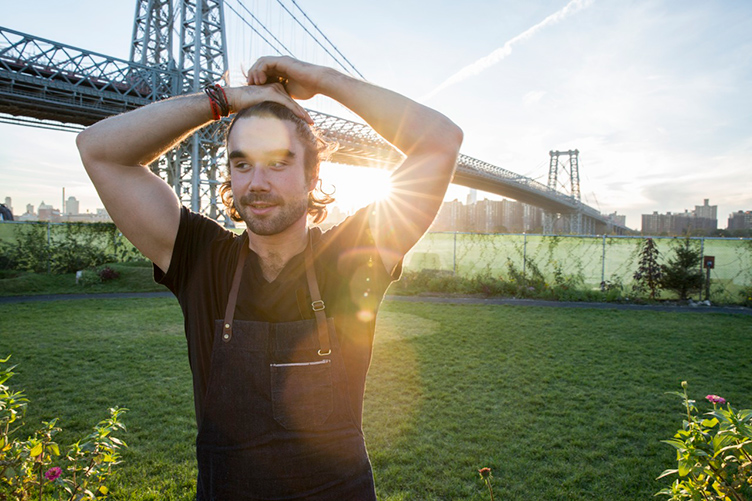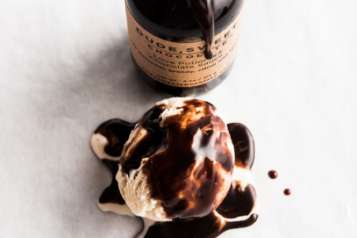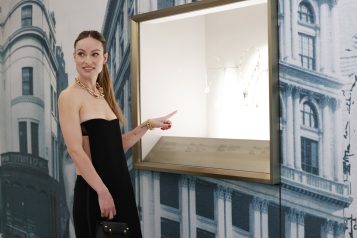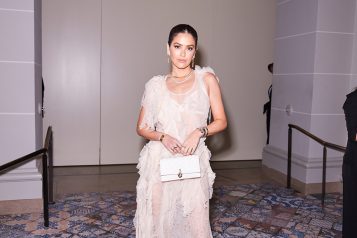Gabe Kennedy is no stranger to mindful eating. In fact, the Colorado-born, Brooklyn-based culinary connoisseur makes matters of the mind a moral duty when mastering a meal. Kennedy’s diverse career has taken him through moments cooking for celebrities like the Clinton family to winning ABC’s The Taste. No matter where the chef ’s professional journey leads him, it always circles back to one common denominator: food.
Food feeds the soul. And if Kennedy’s cooking is anything, it is the quintessential experience of soul. With a focus on all things green and clean, the chef has been able to use his cooking to affect change in people’s homes and lives around the world. Kennedy’s classically trained culinary skills paired with his open-mindedness allows for a whole new realm of possibilities. We get a glimpse of the life and mind of this culinary superstar and what he’s up to next.
Let’s start with your food philosophy, what’s the most important thing to you when creating a meal?
I’m all about maintaining respect and integrity for the ingredient. Because I don’t work day in and day out in one particular kitchen, and my job takes me everywhere, I have the opportunity to be flexible and pull inspiration from different places and people. Ultimately, I think that food is something you want to relate to in the moment.
If you and I decide to cook something right now on this brisk New York day it’s going to be much different than if we were walking in Malibu. It’s not even necessarily what you eat but who you eat with. Being able to take in the company and to be open to that whole part of the experience. From an ingredient standpoint I like to keep my food clean and soulful. I am a classically trained cook.
In what way do you think you come through in the dishes you make?
I always try to pour my personality into the dishes on some level. A lot of the food philosophies that I have are respect for ingredient, restraint, harmony, it’s about letting the naturally beautiful things shine through. Oftentimes that means staying out of its way.
I was born in Boulder; both of my parents are in alternative medicine. I grew up in that world, and I like to have that come through with the food that I make. It’s clean, and you are going to feel better after you eat it. Food is beautiful, and I often don’t have to do too much to it. I am not a fan of turning a fat into a powder or make foam out of this juice. That’s cool, and it has its time and place, but it’s not really where I am at right now.
So to answer your question of how my personality comes through, it’s colorful. I like to use colors. Brightness. I have this formula that I work with, which is salt, acid, texture, heat. I learned that on The Taste, and it always really stuck with me.
I also like to cook my feelings in a way. If I’m feeling really alive and bright there will be lots of life in that. If I’m feeling a little more closed we’re going to go into more of the soups and stews. The emotions that I try to evoke from each particular dish play off of those intangible qualities of predominantly vegetables.
How have your travels influenced your philosophy?
I travel with wide eyes and an open mind; I am a sponge. It could be an ingredient, an herb I find on the riverbanks in Iceland. It could be a way of preparation, for example baking bread underground from geothermal heat, or poaching salmon in the hot springs. It could be a technique, style or interpretation of one simple ingredient, or harmony of many. It’s multidimensional. The beautiful thing about food is the power it holds, the enormous potential for change and impact. Food is the most intimate relationship we have with the environment, and with each other. Culturally, it is remarkable to see the interactions that people often have with food. Taking the time to eat, respecting food and the process is an experience we share at least two or three times a day. As my friend and mentor Allen Lim says, ‘It’s not just what you eat, it’s who you eat it with.”
Some of your travels involve philanthropic work. How do you see food as a catalyst for change?
I am proud to say that I am an ambassador for Concern Worldwide. I work with Concern on food-related projects. Most recently I went to Haiti where I worked with a women’s cooking school in Port-au-Prince, as well as in a rural town where we are building a hospitality industry through bed and breakfast and community center projects. These are simple examples of how food is changing people’s lives and giving them an opportunity to live a fulfilling and inspiring life.
I could dive into policies for hours, but at the end of the day, the most profound change will come from inspiring people to connect with their food, develop a relationship with it and simply being more inquisitive. Ask questions… where has my food been? Who is growing my food? What journey has it taken? Are the people or animals bringing this source of nourishment being treated with respect? Every ingredient has a story, we just need to ask and listen. With every purchase we have the opportunity to make a difference, whether we choose food that supports positive change in the world through sustainable and mindful systems, or by choosing foods that disenfranchise and harm people and the planet.
How have your previous culinary experiences shaped your career today?
My culinary journey started when I was 14 after reading Anthony Bourdain’s book Kitchen Confidential. My parents and I would go out to dinner all the time, and it was something I was involved in but had a curiosity to see behind the veil. I wanted to experience it. I started at an Italian restaurant and then got a job at a sushi restaurant where I worked through high school. It was great, it was the best job I could have imagined as a teen.
Then there was then this point where my mom got sick and was diagnosed with breast cancer. Food became my best friend through this time. One of my most heartfelt ways of giving was by pouring my love and energy into food. While cooking with intention in these moments, it became clear that I wanted to use food as my medium.
I graduated and went to culinary school at CIA [Culinary Institute of America] where I got an externship at Bouley, which is where I spent most of my time throughout college. I got to have a lot of experiences with restaurants at this time, which allowed me to see that I wanted to do something more. I then went to the hotel school at Cornell [University] to understand the ecosystem of food in a different way. If I wanted to make a difference those were things I needed to understand beyond how to chop an onion quickly.
A few steps later I started my own private catering and events company out in the Hamptons with a friend. All of a sudden I was working with my hands again and engaging with ingredients. I decided from there I wanted to do something more impactful, which is when I started a company called Popular Corn. We went to raise money and somehow instead got hired by this private equity group that was investing in all-organic food brands. My experience in food became very diverse, but I felt like I had to reconnect with food yet again.
I ended up getting a gig as a private chef for the Clinton family back in the Hamptons. It kind of felt like House of Cards. They were incredible people, and it was kind of the best training experience for The Taste.
How has life been different after winning The Taste?
I think the biggest lessons I learned from the show had nothing to do with food at all. It really was about tapping into what I want as a person and doing what I want to do versus what people tell me I should be doing. I also learned a lot about dedication and focus.
I had to find that place in myself that I hadn’t really accessed before. I would go to sleep at 8:30 p.m. every night. I would wake up at 4 a.m. I would meditate, get in a little bit of exercise, shower, make a cup of coffee, put on my music and go to the studio by 5 a.m. I also dedicated time to writing a journal every day. I would start with letters of gratitude to the world and re-read them before going into the specifics of what I wanted to do. My goal was to put myself in the best possible state to be successful. Then I knew if I wasn’t successful that I had given it my best shot.
I would say prior to that I had been doing things that I thought I should be doing. I don’t regret any experience at all, but there was something about them that wasn’t clicking in my heart. I only really am going to tap into what gets me excited . It is a little risky because sometimes you don’t know when you’re going to make your next paycheck or where life is going to take you. But at the same time that is what makes me feel alive. The biggest life-changing result was the shift of mindset. It was a shift towards being open and looking at the world in a whole different way.
What are some of your go-to spots in NYC and what is your favorite aspect of the food scene here?
There are so many amazing restaurants in New York City. I find myself frequenting La Superior for tacos, Uncle Boons for Thai and Ducks Eatery for some wild food. I really dig El Rey, as well as any of the Major Food Groups’ restaurants. I love the style of ABC Kitchen. Ootoya for Japanese; I always get the hot stone bowls. As far as sushi I have always been a fan of Blue Ribbon Sushi.
What does 2016 look like for you?
2016 is a big year, and I am so inspired and thrilled to see what happens. I will continue to work with social and food related causes close to my heart. I am also pushing the ball forward on a variety of media-related projects, all aimed at inspiring people to connect with their food. I am working on a cookbook that is aimed at healthful, accessible and simply delicious recipes. I am also developing some products as well as partnering on a brick and mortar restaurant. I get a lot of joy working with clients one-on-one for events, dinners and cooking classes, and I will continue to take those opportunities as they are presented.







